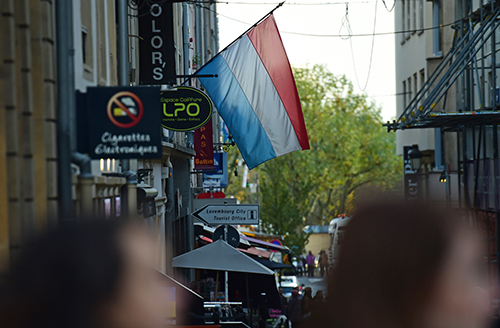The French journalist who helped break the LuxLeaks scandal, which exposed a large-scale, state-blessed system of tax avoidance in placid Luxembourg late last year, was indicted on April 23. A statement from the Luxembourg prosecutor’s office accused Edouard Perrin of “being the co-author, if not an accomplice, in the infractions committed by a former PricewaterhouseCoopers employee” already charged with leaking documents exposing the scheme, according to reports.
In May 2012, Perrin, who works with the Paris-based TV production company Premières Lignes Télévision, was the first to report the LuxLeaks story for “Cash Investigation,” a flagship program for public service broadcaster France 2, made in partnership with BBC One program “Panorama” in the U.K. His reportage was crowned by the Louise Weiss Award for European Journalism in 2012 and fed the International Consortium of Investigative Journalists (ICIJ) LuxLeaks investigation–a collaboration of 80 journalists from 26 countries, which was published in November 2014 by a number of international media outlets.
The report seriously destabilized former Prime Minister of Luxembourg and current President of the European Commission, Jean-Claude Juncker, according to reports. “Nearly all the tax arrangements revealed were signed during his 1995-2013 tenure as Luxembourg’s premier,” the Financial Times wrote on April 23. “But Mr Juncker comfortably survived a vote of no-confidence in the European Parliament late last year.”
There was no indication in the LuxLeaks investigation that the schemes had been illegal under Luxembourg law. However, they were controversial. The investigation “revealed aggressive tax avoidance strategies that damaged national treasuries and hurt taxpayers at a time of austerity throughout the European Union,” ICIJ Director Gerard Ryle said. The revelations also led to a fundamental change in Europe’s tax rules in March, according to reports.
Stung by the accusation of undermining press freedom, the Luxembourg prosecutor’s office released a statement on April 27 that questioned the journalist’s role, implying that Perrin had not limited himself “to gathering information offered by the accused … and would have played a more active role in the committing of these offenses.”
Perrin has not commented publicly on the indictment, but Premières Lignes, which shared a premises with Charlie Hebdo, the French satirical magazine attacked by gunmen in January, has defended his work. “These investigations in the public interest in Europe are perfectly in accordance with the role of journalists as watchdogs of democracy as acknowledged by the European Court of Human Rights,” the production company said in a statement. “Edouard Perrin has just made his legitimate work as a journalist.”
The indictment is seen by many journalists as retaliation and a warning to inquisitive journalists that they should stop digging into the secrets of tax engineering and fiscal paradises. It was strongly condemned by Ryle who, in an April 23 statement, denounced Perrin’s indictment as “an affront to press freedom and public accountability.” Ryle added: “For a founding member of the EU to bring charges against a journalist in relation to reporting that is clearly in the public interest shows a lack of respect for the important role journalism plays in holding the powerful accountable.”
The indictment also contradicts the public discourse of the European Union, which has been touting the need for investigative journalism to combat fraud and safeguard the rule of law in member states and in accession countries by offering awards for investigative journalism.
